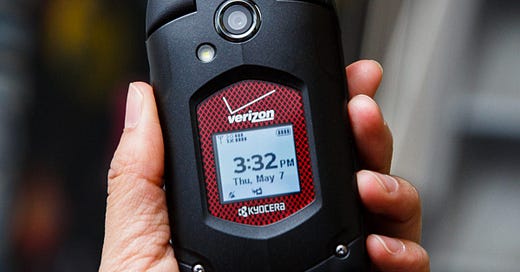What I've learned one year after I switched to a flip phone
Spoiler: It's been fantastic! An absolute net positive.
I was surprised this week to look through my records—okay, my Gmail—and see that it’s been very nearly one year to the day since I ditched my iPhone and switched to a flip phone. I say “surprised” because it doesn’t feel like a year—it hasn’t really felt like anything. It’s just felt like normal life, which was of course the point all along.
Here’s what I’ve learned after a year with a flipper:
I’m never going back to a smartphone. We’ll just get that out of the way first. No spoiler alerts here. I hate smartphones and will never own one again unless for some inconceivable reason I am absolutely forced into a job that demands I have one, and even then it’ll still just be a work phone. In all likelihood I will live the next several decades without ever personally carrying a smartphone again. This is liberating.
Having a flip phone lets you do more things. The smartphone is a comprehensive time suck and it is absolutely designed to be that way. Everything about it—the design itself, the size of the device, the visuals, the sounds, the motions, the apps, everything—is meant to capture your attention and hold it. It does this exceptionally well. Recent data indicate that Americans spend “an average screen time of 5.4 hours on their mobile phones daily.” Five hours and 24 minutes per day on your phone. That is a lot of time. Most importantly, it’s time you could easily be doing other things—reading, writing, cooking, barbecuing, crafting, cleaning, talking to friends or family, playing with your kids, running your dog. All of these things are so much more productive than just being on your smartphone, scrolling through Facebook, watching a random video you don’t care about, reading some thread on Twitter you’re not going to remember twelve minutes from now. Trust me!
Having a flip phone lets you do things more consciously and deliberately. When you ditch your smartphone, you can and will pay much more thorough and rewarding attention to whatever you’re doing. You won’t have some supercomputer at arm’s length, ready to gobble up the limited, precious amount of mental and emotional energy you have on any given day. You’ll read books more carefully, watch movies with more interest, be with friends and family more fully and presently. It turns out that when you don’t have something constantly mewling for your attention, your attention can be deployed more effectively and efficiently in all other areas of your life.
Having a flip phone lets you actually look at the world like you used to, namely better. Here’s something you might not know: They’re not making flip phones with decent cameras. Even today there’s no real market incentive there. I think mine might be four megapixels; it takes pictures that are the functional equivalent of Polaroids. Galileo probably saw Saturn more clearly through his telescopes than you can see a landscape through my phone. I barely use it for anything at all. But that’s fine, and you know why? Because you don’t have to take a freaking picture or a movie of every interesting thing you encounter. It’s okay to not do that. Your life was really quite good before you were always doing that. If you find something neat, or witness some notable public event of some kind, you can just look at it, observe it, experience it with your own eyes. Later, if you want to, you can tell somebody about the thing you saw. That’s also fine, human communication is great, you should always be willing to do more of it.
Having a flip phone helps you just sit and be still with your thoughts. Nobody does this anymore. I mean very, very few people just sit in stillness and silence anymore. Smart phones are always out every time there’s a lull—where you do think those daily 5.4 hours come from? Look around you the next time you’re at a traffic stop surrounded by other cars; most of the people in the cars will probably be looking at their phones. Look around on busses, subway cars, in parks, in libraries, anywhere where anyone might come to rest for a moment. In most cases the phones are probably out. And this is not good. Just sitting and thinking about stuff—thinking about ideas, or concepts, or people, or discussions, or a book you read, or an argument you had, or something you want to cook, or whatever—that’s all good. It sharpens your mind; it literally turns you into a more thoughtful person. It’s good stuff and it’s better for you than the endless scrolling and swiping.
In summary: I have not at all regretted switching to a flip phone. It’s been essentially an unalloyed good. The few very minor inconveniences associated with the switch are hardly even worth mentioning. If you’re on the fence about it one way or the other, I cannot recommend highly enough taking it for a test spin. Put your smartphone in a drawer for a couple days, get a low-rent Tracfone, and see how you like it. I think there’s a decent chance you will—and if nothing else you’ll have gained 10.8 hours of your life you would’ve lost to the smartphone over that time. It’s a good deal.




Awesome, I am in the same boat. Almost 2 years with kyocera duraxv, never going back!!
Had a sorta relatable transition from full on smart phone with social media noise to a simplified GrapheneOS setup. I still carry another phone for rare moments where it is needed but I am more calculated with plans and spend 0 hours on Instagram on this phone. It's opened up a lot of time. Highly recommend ditching the Gmail. One of the points of my phone transition was limiting Google tracking me.